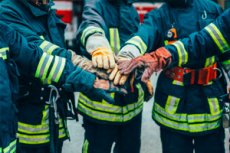
与普通人群相比,消防员罹患各种癌症(例如胃肠道癌症和呼吸系统癌症)的风险异常高。此前已有研究调查了他们的抗癌经历以及他们对饮食在多大程度上有助于降低癌症风险的看法。这些研究揭示了消防员群体的饮食习惯与癌症预防意识之间的关系。了解他们的看法可能有助于制定有针对性的干预措施以降低癌症风险,并重点关注饮食在消防员癌症预防中的作用。
《营养教育与行为杂志》最近发表的一篇文章探讨了美国消防员对癌症历史的理解、他们对癌症的态度以及他们对饮食作为癌症预防措施的看法。
文章作者、俄克拉荷马大学史蒂文森癌症中心 TSET 健康促进研究中心注册营养师 Ashley Brown 博士解释说:“鉴于饮食与癌症风险之间的关联,以及消防员的癌症风险,了解如何通过循证干预措施减轻这些风险因素至关重要。”
该研究采用混合方法和横断面设计,通过美国各地的专业网络招募参与者,形成全国样本。调查收集了参与者的癌症病史数据以及他们对营养在癌症预防中作用的看法,并基于现有调查和健康预测工具“健康信念模型”进行了定量和定性问卷调查。
数据分析包括使用 SPSS 统计软件进行的定量评估和定性内容分析,旨在了解饮食改变如何降低癌症风险。我们采用严格的编码流程来确定干预策略和饮食相关因素。具体而言,我们利用行为改变技术分类法第一版 (BCTTv1) 对定性回复进行编码,以便将消防员报告的饮食改变意愿转化为成熟的循证行为改变技术,为未来的干预措施提供参考。
共有471名消防员参与了这项研究。近一半(48.4%)的受访者强烈同意自己有患癌风险,44.6%的受访者同意改变饮食习惯可以降低患癌风险。最常见的BCTTv1代码是培训类型,包括“如何执行某种行为的指导”(45.1%,n=189),其次是专注于执行某种行为的代码(例如“行动计划”[24.8%,n=104])。在定性回复中,许多人表达了对错误信息的担忧,并希望确切了解通过改变饮食习惯可以实现多大程度的风险降低。许多人还表达了对系统性障碍的担忧,例如他们所在消防站的饮食条件。
研究表明,除了食物环境的宏观和微观层面变化外,消防员还渴望获得个性化支持,以应对其特定风险,并帮助他们实施最有可能降低癌症风险的改变。COVID-19 疫情加剧了人们对虚假信息的担忧,包括在营养相关领域,这凸显了提供准确、具体信息以支持明智饮食决策的必要性。鼓励未来的研究在制定针对消防员的干预措施时考虑这些发现,并探索针对其他战术人群的类似策略。
布朗博士评论道:“与之前的研究一致,我们发现消防员意识到自己患癌症的风险增加,并愿意改变饮食习惯以保持健康。尽管有人担心饮食对癌症风险的影响,但大多数没有癌症病史的参与者认为,改变饮食习惯可以降低患癌风险。”

